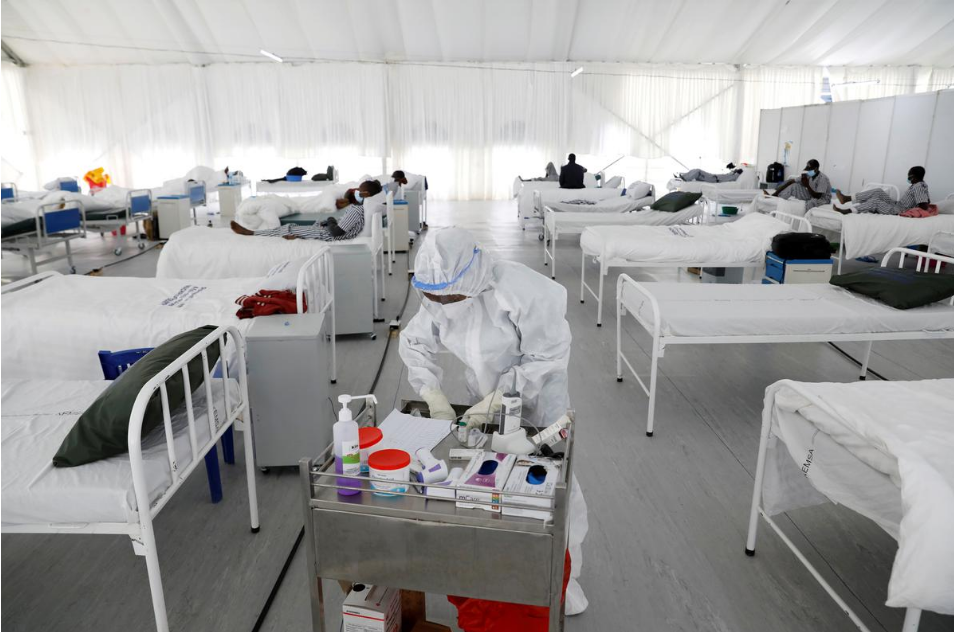
U.S. President Donald Trump stands next to a U.S. map of reported coronavirus cases as he speaks about his administration's plan to reopen schools at a news briefing, Washington, DC, U.S., July 23, 2020. /Reuters
U.S. President Donald Trump stands next to a U.S. map of reported coronavirus cases as he speaks about his administration's plan to reopen schools at a news briefing, Washington, DC, U.S., July 23, 2020. /Reuters
The United States recorded more than 1,000 deaths from COVID-19 for the fourth straight day on Friday as almost 40 countries have reported record single-day increases in coronavirus infections over the past week.
At least 1,019 fatalities due to COVID-19 were confirmed in the U.S. on Friday, following 1,140 on Thursday, 1,135 on Wednesday and 1,141 on Tuesday. The numbers have been driven in large part by a surge in infections in Arizona, California, Florida, Texas and California. In an interview with NBC News, Dr Deborah Birx said the worst could be past in hard-hit southern and western states.
"We're already starting to see some plateauing in these critically four states that have really suffered under the last four weeks, so Texas, California, Arizona and Florida, those major metros and throughout their counties,"Birx said.
Since COVID-19 will continue wreak havoc in the country, U.S. Treasury Secretary Steven Mnuchin said on Saturday that the Trump administration supports extending enhanced unemployment benefits until the end of the year, albeit at a reduced level, to help Americans deal with the economic slowdown from the pandemic,
The unemployment benefits of 600 U.S. dollars a week that Congress approved earlier in the pandemic will expire on July 31. Mnuchin said Republicans are talking about capping wage replacement at 70 percent of a worker's prior pay to replace the current pandemic unemployment benefits which Trump and some Republicans worry it will disincentivize unemployed Americans to return to work because they were earning more through unemployment than their job.
"We want to make sure that there's a technical correction, so that people don't get paid more money to stay home than to work," he said, adding initial language of the legislation is to emerge on Monday and a deal on the standalone coronavirus relief package could be reached before the July 31 deadline.

A family use a hand sanitizer station in Washington, U.S. July 24, 2020. /Reuters
A family use a hand sanitizer station in Washington, U.S. July 24, 2020. /Reuters
Daily new cases surge globally
COVID-19 cases have been increasing not only in the U.S., Brazil and India, which have dominated global headlines with large outbreaks, but in Australia, Japan, Israel, Bolivia, Sudan, Ethiopia, Bulgaria, Belgium, Uzbekistan and among others. Many countries, especially those where officials eased earlier social distancing lockdowns, are experiencing a second peak.
According to Reuters, at least seven countries recorded its highest daily increases three weeks ago and the number rose to at least 13 countries two weeks ago to at least 20 countries last week and to 37 countries this week.
In Australia, officials enforced a six-week partial lockdown and made face masks mandatory for residents in the country's second-largest city, Melbourne, after a fresh outbreak.
Australia and Japan, which also posted a daily case record this week, both warned of a rise in infections among young people, many of whom celebrated the end of social restrictions at bars and parties.
In Mexico, which also posted a daily record this week and has the fourth-highest death toll of any country, officials warned that a downward trend in case numbers that began in mid-June – about the time the city began relaxing social distancing measures – could reverse.
Based on the rate of hospital admissions over the past week, Mexico City Mayor Claudia Sheinbaum said, hospitalization levels by October could exceed those registered in June, the height of the pandemic.

A nurse works inside a field hospital built on a soccer stadium in Machakos, Kenya, July 23, 2020. /Reuters
A nurse works inside a field hospital built on a soccer stadium in Machakos, Kenya, July 23, 2020. /Reuters
In Europe, where the summer vacation season is in full swing, a new daily record figure in Spain is likely to deter tourists from visiting one of the continent's most popular destinations.
In Africa, Kenya recorded a record high daily case number less than two weeks after reopening activity, including domestic passenger flights. President Uhuru Kenyatta, who had announced international flights would resume on August 1, has summoned officials to an emergency meeting on Monday to discuss the surge in cases.
In the Middle East, Oman imposed new restrictions that begin on Saturday in addition to a two-week lockdown that will overlap the Islamic feast of Eid al-Adha after reporting a record number of cases.
A surge in cases usually precedes a rise in deaths by a couple of weeks. The true numbers of both cases and deaths are almost certainly underreported, particularly in countries with poorer health care systems, health experts and officials say.
"We will not be going back to the 'old normal'. The pandemic has already changed the way we live our lives," World Health Organization (WHO) Director-General Tedros Adhanom Ghebreyesus said this week. "We're asking everyone to treat the decisions about where they go, what they do and who they meet with as life-and-death decisions – because they are."
(With input from Reuters)